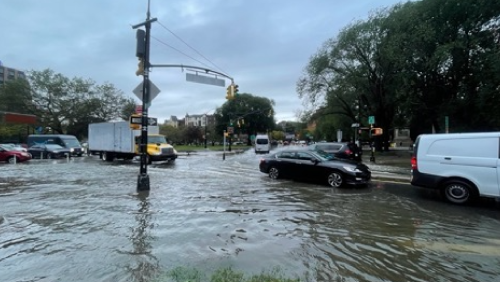Disclosure is Not Enough: Assessing New York’s New Flood Disclosure Laws in Light of New Flooding
October 6, 2023 by Connor Kolet

Flash Flooding Across Roadways in Flatbush, Brooklyn New York on September 29th, 2023.
After New York City experienced shocking flash floods on September 29th, its lack of long-term solutions to chronic flooding has come under media scrutiny. In this article, Connor Kolet addresses the shortcomings of new short-term disclosure policies for renters in flood zones, and why more needs to be done for low income and vulnerable tenants.
On September 29th, 2023, parts of New York City were inundated by a shocking series of flash floods. John F. Kennedy International Airport saw eight inches of rainfall in one day, and the borough of Brooklyn saw a month’s worth of rain in a few hours.[1]
According to an experimental rapid framework study conducted by European scientists associated with the organization ClimaMeter, climate change has made this type of storm ten to twenty percent wetter compared to last century.[2] Additionally, a federal government analysis has found that the amount of precipitation in heavy rainfall events in the US Northeast has increased by 55 percent since the 1950s.[3]
Unfortunately, it seems that New York’s issues with flooding are long-term. New York City’s Chief Climate Officer, Rohit Aggarwala, stated in a recent interview that “[e]verything the science tells us is that [the flooding] is going to get worse before it stabilizes. . . Climate is changing faster than our infrastructure can keep up.”[4]
Part of the infrastructure Mr. Aggarwala is referring to is the capacity of New York’s sewage drainage systems, which is currently capped at 1.75 inches of rainfall per hour.[5] On September 29th, more than two inches of rain dropped between 8 and 9 a.m.[6] Improving the sewer system’s capacity is likely no easy task: a 2021 report following the devastation caused by Hurricane Ida projected that sewer system recalibration would take several decades and cost $100 billion.[7]
In the face of massive infrastructural hurdles, the New York State Legislature has passed short-term solutions to spread awareness of living in floodplains, such as mandatory disclosure laws for previous flood history and current flood risk of leased premises.[8] The new statute, effective as of June 2023, requires landlords to disclose to tenants if any or all of the leased premises is within a FEMA-designated floodplain,[9] a Special Flood Hazard Area (a 100-year floodplain)[10], or a Moderate Risk Flood Hazard Area (a 500-year floodplain).[11] The statute also requires disclosure to tenants of “any prior flood damage to the leased premises due to a natural flood event, coastal storm surge, tidal inundation, or river overflow”[12] as well as information on how to apply for flood insurance through FEMA.[13]
While the legal mandate of disclosure to vulnerable tenants is a great step forward for an issue with no easy financial or temporal solution, it is no quick fix for the thousands of residents of basement apartments – including 50,000 illegal basement units in New York City[14] – that are expecting serious flooding in the coming decades.
Tragically, the victims of heavy flood events in New York in recent memory have been those living in basement apartments.[15] 11 of the 13 victims of Hurricane Ida drowned in their homes.[16] Most of the 44 victims of Hurricane Sandy were also found in basements.[17] A 2021 BASE analysis estimated that most basement apartment tenants are nonwhite and rent-burdened.[18] Those who choose basement apartments as an option are doing so because they are priced out of other living options in the city.[19]
The troubling development of the new disclosure law is that a large portion of tenants with high exposure to flood risk have little leverage to reject flood zone living situations even if made aware of the threat through mandatory disclosures. While the new disclosure law helps renters who may be in a more economically advantageous situation and can afford flood insurance, a large section of New Yorkers may slip through the cracks of the statute’s protection. Considering that New York does not have any quick-fixes to chronic flooding in the next few decades, lawmakers need to ramp up protections for low-income New Yorkers who may not have a choice but to live in a flood zone.
[1]Oliver Milman, Type of Storm That Drenched New York is up to 20% Wetter due to Climate Crisis, The Guardian (Oct. 2, 2023, 2:33 PM), https://www.theguardian.com/environment/2023/oct/02/new-york-city-flooding-rain-storm-climate-change.
[2] Cristen Hemingway James, Climate Crisis Makes Storms Like the One That Just Flooded NYC up to 20% Wetter, Study Finds, EcoWatch (Oct. 3, 2023), https://www.ecowatch.com/new-york-flooding-climate-change.html.
[3] Milman, supra note 1.
[4] Rebecca Picciotto, New York’s Floods Weren’t a One-Off — Here’s how the City is Preparing for the Future CNBC (Oct. 4, 2023, 1:50 PM), https://www.cnbc.com/2023/10/04/new-york-city-flood-infrastructure-climate-chief.html.
[5] Patrick McGeehan & Hilary Howard, Why New York City Keeps Flooding, N.Y. Times (Sept. 29, 2023), https://www.nytimes.com/2023/09/29/nyregion/nyc-sewer-system-infrastructure.html.
[6] Id.
[7] Id.
[8] N.Y. Real Prop. Law § 231-b(1)(McKinney 2023).
[9] N.Y. Real Prop. Law § 231-b(1)(a)(McKinney 2023).
[10] N.Y. Real Prop. Law § 231-b(1)(b)(McKinney 2023).
[11] N.Y. Real Prop. Law § 231-b(1)(c)(McKinney 2023).
[12] N.Y. Real Prop. Law § 231-b(1)(d)(McKinney 2023).
[13] N.Y. Real Prop. Law § 231-b(2)(McKinney 2023).
[14] Nolan Hicks, Fixing NYC’s 50K Illegal Homes Would Cost $14B: City, N.Y. Post (Sept. 5, 2022, 4:35 PM), https://nypost.com/2022/09/05/fixing-nycs-50k-illegal-homes-would-cost-14b-cityit-would-cost-the-big-apple-nearly-14-billion-to-bring-the-estimated-50000-illegal-basement-apartments-across-new-york-city-up-to-code-the-post-has-lea/.
[15] Bringing Basement Apartments Into the Light: Establishing a NYC Basement Board to Provide Basic Rights, Responsibilities, and Protections for Basement Apartment Residents and Owners, N.Y.C Comptroller Brad Lander (Aug. 30, 2022), https://comptroller.nyc.gov/reports/bringing-basement-apartments-into-the-light/#:~:text=Of%20the%2013%20who%20died,housing%20in%20unregulated%20basement%20apartments.
[16] Id.
[17]Kriston Capps & Sarah Holder, NYC Flooding Renews Calls for Safer Basement Apartments, Bloomberg: CityLab Housing (Sept. 30, 2023 at 11:30 AM), https://www.bloomberg.com/news/articles/2023-09-30/nyc-flooding-renews-calls-for-safer-basement-apartments.
[18] Emma Whitford, In New York’s Fight to Legalize Basement Apartments, What About Cellars?, CityLimits (Mar. 13, 2023), https://citylimits.org/2023/03/13/in-new-yorks-fight-to-legalize-basement-apartments-what-about-cellars/.
[19] Id.

